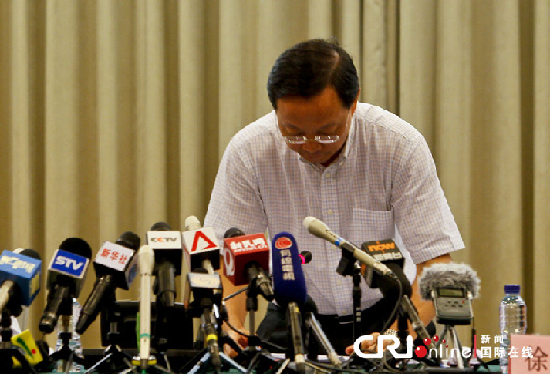Human error blamed for Metro crash
 0 Comment(s)
0 Comment(s) Print
Print E-mail
China.org.cn, September 29, 2011
E-mail
China.org.cn, September 29, 2011
An operator of Shanghai's subway Line 10 admitted Wednesday that human error played a role in Tuesday's train crash, Xinhua reported.
An initial investigation showed that a sudden loss of power caused the signal system to fail, forcing the trains to be operated manually. Personnel failed to follow relevant management rules, which led to the accident.
Shanghai Shentong Metro Group said it had given technical data and records to a investigation task force led by the city's work safety bureau for further checks.
"Metro staff on Line 10 used a manual dispatch mode after the signaling system was affected by a loss of power," Shentong said on its website. "However, the staff on duty failed to strictly comply with management regulations, which caused the accident."
The Metro operator said a signal glitch was spotted about 40 minutes ahead of the crash. Before the accident happened, communication between Metro stations relied on telephones to control the trains.
Luo Yanyun, a professor at Tongji University's Urban Mass Transit Railway Research Institute, said yesterday: "Using the telephones for dispatch is usually the last choice the Metro operator would make once the signals are cut."
Luo said the method depended on human control and thus was "of relative poor safety. It will affect normal operation but the accident should have been avoided."
Luo added: "I have been calling for the government to set up a whole safety analysis and evaluation system on the subways."
Staff controlling the trains after a signal failure are supposed to give following trains a signal to carry on only after the front train leaves the section between two stations.
Line 10's signal provider, Casco, a joint venture of the China Railway Signal and Communication Corp and France's Alstom SA, came under fire after the accident as a series of glitches had previously been reported on the line.
The company was held responsible for a two-train crash on Line 1 in December 2009.
Luo said the lack of good management and the poor abilities of Metro staff were concerns with the city boasting it would have the world's longest Metro track, more than 500 kilometers, by next year.
"The focus still lies on construction now," said Luo. "The operation management lags behind."
Luo said he began working with the city government on upgrading Metro safety system soon after the 2009 crash but said there had been "little progress so far."
Problems from signal glitches to water leaks at many new Metro stations have frequently hit the headlines as more lines come into service.
The city's top advisory body, the Shanghai People's Political Consultative Conference, said previously that not enough professionals were being trained to ensure the safe operation of the Metro system.
It also said the speed of construction had not left enough time for testing.
The city's political advisers said another 30,000 technical and management professionals, nearly twice current levels, would be needed by 2013.
Shentong Metro Group has recruited graduates in recent years, but the company said it was still concerned about a lack of experience in key positions. It said it would be strengthening staff training and holding exams to ensure the training is effective.
(Shanghai Daily contributed to this story)






